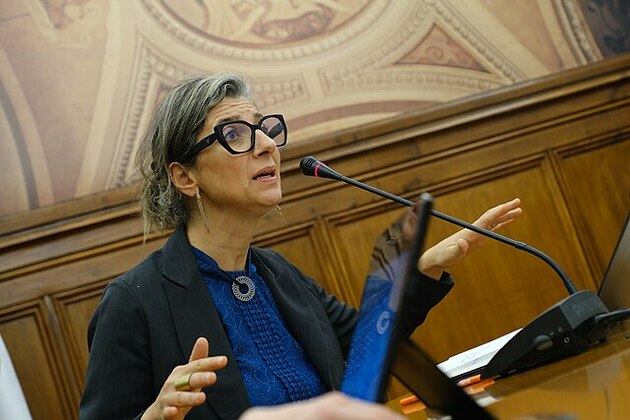Worried about heat and fire this summer? Here's how to prepare
The Conversation
19 Sep 2023, 12:08 GMT+10

The Northern Hemisphere summer brought catastrophic fires and floods to many countries. Down south, the winter was the hottest ever recorded in Australia, fuelled by record ocean temperatures.
Small wonder many Australians are worried about what summer will bring, as a likely El Nino threatens hot and dry fire weather. In the early southern spring, the fire season has already kicked off in New South Wales, Queensland and the Northern Territory, just as anticipated in seasonal predictions. The recent spring heatwave saw dozens of marathon runners in Sydney hospitalised and even threatened lives.
What does this mean for you? It means if you live in the bush, country towns or the outskirts of major cities, it's time to prepare for the possibility of fire. And if you live anywhere in Australia, you need to plan for heat.
Fire gets attention - but extreme heat can do more damage
Bushfire dominates how we think about summer risks in Australia. But in reality, extreme heat hits harder. That's because extreme heat can be extremely widespread - and a hidden killer. In particularly hot summers, almost all of us will face some kind of heat stress. Days where you just can't cool down, or where underlying health conditions flare up.
As the climate becomes less stable, we're seeing more heat domes - slow-moving high-pressure systems which sit atop an area and blast it. During extremely hot days, we often long for night when the temperature drops. But heat domes can keep heat high overnight.
High heat is more dangerous early in the season before people have acclimatised - and often at relatively low temperatures compared to later in the year.
Will bushfires be back this summer?
For three years, Australia has been preoccupied with floods. Now we're heading back into fire risk. But it may be different to what you expect. La Nina's cooler, wetter conditions have led to strong vegetation growth. Grasses dry out more quickly than other vegetation types, meaning grasslands switch rapidly from moist to tinderbox.
The most likely fires we'll see this season will be grass, scrub and city fringe fires. Very large forest fires like those of the Black Summer are less likely, as these need extended dry conditions.
These fires will be of direct concern to those outside major cities. But city residents will see the effects too, in smoke, transport disruptions and potential crop and livestock losses which can reduce food availability.
What should you do to get ready?
1. Fire
It's essential to think ahead as much as possible. Let's say you live near a forest or grassland which could be a fire risk. Which roads would you take? Where would you go? How could you make sure all your loved ones are contactable - and if they're away from you, how could you make sure they can get to safety? Record the plan and keep a printed copy.
If you're in a bushfire prone area, explore and make use of planning resources offered by every state, territory and local emergency agency. Download your state's hazard or bushfire app with real-time alerts.
With your family, friends or housemates, run through different scenarios so you're on the same page. When should you stay? When would you leave? Practice your evacuation.
If you've got lots of leaf litter, dry grass or fallen branches around your home or property, it's a good time to reduce fuel loads and ensure your emergency exits are clear.
If you're planning a holiday in bushfire prone areas, you also need to make safe travel plans.
2. Heat
Getting ready for intense heat means preparing your home. Is your house well insulated? If you have an air conditioner, is it running well and has it been serviced? Could you reduce how much heat comes through your windows by using shade cloth, awnings or window coverings? A bushfire landscaped garden or heat reflective paint can also help reduce fire risk or cool the house. If you're renting, bring any issues relating to gaps in doors or windows or faulty electricity to the attention of the real estate agent.
Freezer blocks wrapped in towels and refrigerated spray bottles are also cheap cooling options if you have limited cooling options in your house.
If you are working from home, make sure you have backup cooling methods such as battery-operated fans in case of blackouts.
If your home is not well prepared for heat, plan ahead by looking for safer spaces such as a friend's well insulated or air-conditioned home, a shopping centre, or library where you can seek refuge. Read the Red Cross heatwave preparation guide.
Write a list of key contacts and friends or neighbours who might be particularly at risk and put them in your phone and on your fridge.
As the heat builds, check for heatwave warnings on the Bureau of Meteorology's site. Know what the symptoms of heat stroke and exhaustion look like.
Businesses must understand their responsibilities to their employees during extreme heat and have plans to manage these.
Do prepare but don't panic
This year is showing us what climate change looks like. As these risks build and become more severe, we can no longer just think "she'll be right".
As climate risks expand and become increasingly severe, understanding and actively planning for these risks is now an imperative.
Read more: Top 10 tips to keep cool this summer while protecting your health and your budget
Authors: Celeste Young - Collaborative Research Fellow, Sustainable Industries and Liveable Cities (ISILC), Victoria University | Nima Izadyar - Lecturer, Victoria University | Roger Jones - Professorial Research Fellow, Victoria University 
 Share
Share
 Tweet
Tweet
 Share
Share
 Flip
Flip
 Email
Email
Watch latest videos
Subscribe and Follow
Get a daily dose of Massachusetts Sun news through our daily email, its complimentary and keeps you fully up to date with world and business news as well.
News RELEASES
Publish news of your business, community or sports group, personnel appointments, major event and more by submitting a news release to Massachusetts Sun.
More InformationInternational
SectionOver 60 companies named in UN report on Israel-Gaza conflict
GENEVA, Switzerland: A new United Nations report alleges that dozens of global corporations are profiting from and helping sustain...
UK lawmakers desigate protest group as terrorist organization
LONDON, UK - Lawmakers in the United Kingdom have voted overwhelmingly to proscribe the direct-action group Palestine Action as a terrorist...
Dalai Lama to address Buddhist conference, reveal succession plan
DHARAMSHALA, India: The Dalai Lama is set to address a significant three-day conference of Buddhist leaders this week, coinciding with...
US Supreme Court backs Texas efforts to shield minors online
WASHINGTON, D.C.: In a significant ruling last week, the U.S. Supreme Court upheld a Texas law requiring age verification for users...
Turkey, France battle wildfires amid early Europe heatwave
ISTANBUL/PARIS/BRUSSELS: As searing temperatures blanket much of Europe, wildfires are erupting and evacuation orders are being issued...
Venetians protest Bezos wedding with march through the town
VENICE, Italy: Over the weekend, hundreds of protesters marched through the narrow streets of Venice to voice their opposition to billionaire...
Business
SectionStandard and Poor's 500 and and Nasdaq Composite close at record highs
NEW YORK, New York -U.S. stock markets closed with broad gains on Thursday, led by strong performances in U.S. tech stocks, while European...
Persson family steps up H&M share purchases, sparks buyout talk
LONDON/STOCKHOLM: The Persson family is ramping up its investment in the H&M fashion empire, fueling renewed speculation about a potential...
L'Oreal to buy Color Wow, boosts premium haircare portfolio
PARIS, France: L'Oréal is making a fresh play in the booming premium haircare segment with a new acquisition. The French beauty conglomerate...
Robinhood launches stock tokens for EU investors, adds OpenAI
MENLO PARK, California: Robinhood is giving European investors a new way to tap into America's most prominent tech names — without...
Wall Street diverges, but techs advance Wednesday
NEW YORK, New York - U.S. stocks diverged on Wednesday for the second day in a row. The Standard and Poor's 500 hit a new all-time...
Greenback slides amid tax bill fears, trade deal uncertainty
NEW YORK CITY, New York: The U.S. dollar continues to lose ground, weighed down by growing concerns over Washington's fiscal outlook...













